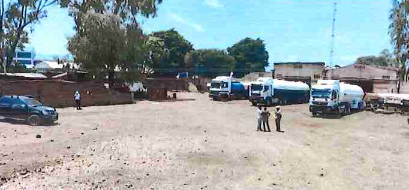 An aerial site of the garage where the incident occurred/EPRA
An aerial site of the garage where the incident occurred/EPRAThe Energy and Petroleum Regulatory Authority (EPRA) has ordered an immediate suspension of all LPG operations at Topline Traders Limited following a devastating explosion at its Nakuru garage in which two workers were killed.
The decision by the agency comes after a probe into the April 7 incident, which revealed a cascade of negligence on the part of the company.
A senior official from the company confirmed to the Star to having their activities suspended.
“Yes. We have suspended the operations,” Abdi Elmi said while declining to reveal more details into the matter.
In a 28-page investigative report, reviewed by the Star, the agency found out shocking breaches of safety protocols at the garage that caused the deaths.
It includes the use of faulty gas detectors, unauthorised hot work inside a poorly purged LPG tanker, and a complete disregard for confined space entry procedures.
“The primary cause of the explosion was the failure by Topline Traders Limited to ensure safe maintenance practices during hot works inside an LPG tanker,” the report states.
Residual vapours within the tank, it said, were ignited by lighting a gas torch, triggering a deflagration.
“The confined space amplified the blast pressure, resulting in severe injuries to personnel. The absence of proper confined space entry protocols and the failure to implement continuous gas monitoring allowed these hazardous conditions to develop unchecked.”
The explosion, it states, happened during the hot works which is the cutting of the metal plates that had “ostensibly” been gas freed.
An account of events of the fateful from the report states that the deceased- Jeremiah Mwangi and another worker were cutting dislodged metal plates inside an LPG tanker that had been undergoing maintenance since April 3.
Unbeknownst to them, residual liquefied petroleum gas (LPG) vapors lingered inside the vessel, despite four days of natural ventilation, creating a lethal explosive atmosphere.
At approximately 11:30am, as Mwangi ignited an LPG torch to continue the work, the tanker erupted in a violent explosion.
The blast ejected automotive engineer Enock Kibet Cheruiyot, who had been perched on the manhole rim assisting with a flashlight, hurling him several meters onto a metal plate.
He died instantly from severe head and internal injuries.
A postmortem report indicates that he suffered multiple rib fractures and liver damage.
Mwangi who is said to have suffered burns to 40 per cent of his body succumbed to respiratory a few days later.
In arriving at its conclusion, EPRA’s “Five Whys” analysis traced the disaster to a weak safety culture and poor oversight, noting workers assumed natural ventilation.
It said the supervisors prioritised expediency over safety, and management neglected investments in certified equipment like explosimeters or confined space training.
The Swiss Cheese Model, applied by investigators, highlighted layered failures in organisational complacency, inadequate hazard identification, and engineering oversights like using non-intrinsically safe tools.
“This was not an accident, it was a preventable tragedy,” said EPRA.
Under the suspension order, the company is required to develop a Corrective Action Plan (CAP) addressing all violations and retrain staff on confined space entry and gas detection.
It is also required to acquire calibrated explosimeters and explosion-proof gear, and hire independent auditors to certify compliance before resuming operations.











